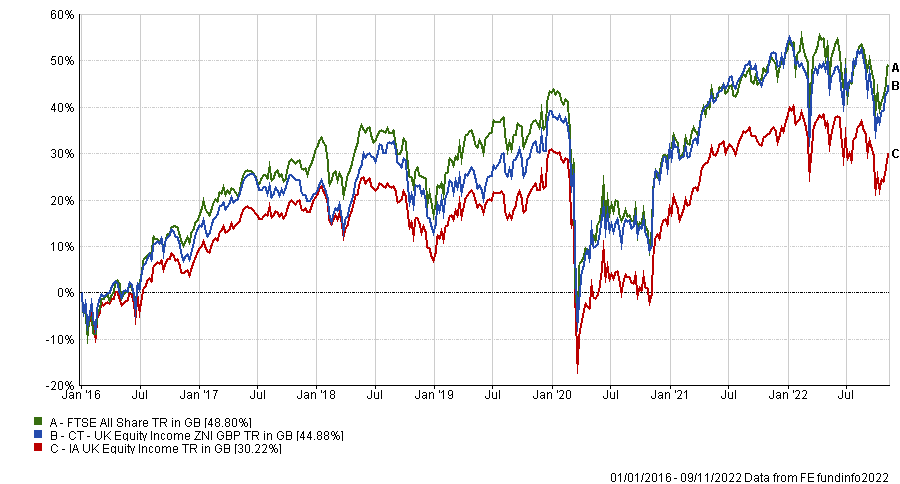Richard Colwell (pictured) is one of the most well-known figures in the UK asset management industry, having run the popular CT UK Equity Income fund for more than a decade.
The veteran stock picker is to retire at the end of the year, but before he leaves Trustnet sat down with him to find out how he has successfully navigated markets throughout his career and what investors can learn from his mistakes.
One key takeaway from his time at the helm of the second largest UK equity income fund is to not worry about getting things completely wrong.
Indeed, the manager pointed to his own mistake in not backing mining companies despite this being the best sector for returns among FTSE 100 companies in six of the past seven years.
“A lot of income managers profited, having bought very well when commodity prices fell aggressively at the end of 2015,” said Colwell.
However, he was convinced that he “had more time” and that the great commodity supercycle would underwhelm as Chinese growth stalled.
“I thought it would take time to work out,” said the CT UK Equity Income manager. “As it transpired there was another massive stimulus from the government in China and metal prices did extremely well.”
However, it is important that investors look at the entire picture, rather than just the binary call made on whether to buy or not.
Colwell said: “If you look at a decision in isolation it might look very poor or good, but it is how did you recycle the funds elsewhere, how did you reshape the portfolio. And also over what timeframe are considering the result?”
Indeed, some decisions can look foolhardy in the short term, but on a three-year view it could look like the right decision. In the case of commodities, the manager said he remains “convinced that my thesis is not unreasonable and could well play out” but concedes that he was at least six years too early. “So be it,” he added.
The other factor is what the opportunity cost of the investment was. For example, despite not owning commodities, since the start of 2016, the fund has performed broadly in line with the FTSE All Share index and beaten its average IA UK Equity Income peer by more than 14 percentage points, as the below chart shows.
Total return of fund vs sector and benchmark since start of 2016

Source: FE Analytics
“Do I beat myself up? No. The performance of the fund has been pretty reasonable despite that, which proves that it is about what you do own and having conviction on the companies where you think you have an edge rather than worrying about what you don’t own,” he said.
The behavioural aspect of investing is “as important if not more so than the intellectual debate”, he argued, and investors should not “obsess” over what they have done in the past as the decision has already been made.
“You want to celebrate the successes but don’t overdo it. But don’t catastrophise or beat yourself up too much when you go through a bad time of it,” the CT UK Equity Income manager said.
This can be used for all sorts of examples. While the above mining anecdote hinged on a macroeconomic factor, when it comes to picking stocks issues such as profit warnings or markets souring on a company also affect returns.
Unfortunately, these are part and parcel for investors, but there is a danger that they can internalise this as an individual error, rather than an unfortunate event.
“It is easy with hindsight and experience, but the key is not to confuse the result with the process. Sometimes you can have done good work, but events conspire. It doesn’t mean that the recommendation didn’t prevail outside of external issues that you didn’t foresee,” he said.
“The important lesson of that is to remain with your conviction and on the front foot. The worst thing you can do is become more timid in your investment views and your style as a fund manager.”
Colwell argued that by overdiversifying a portfolio, managers can inadvertently become like the index, something they are guaranteed to underperform once trading costs are taken into account.
“In the world we are in now where there is more money in passives and quant-driven ETF baskets, you have to stand for something different. It is an important role that an active manager has,” he said.






